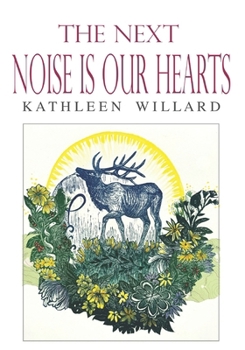The Next Noise Is Our Hearts
-Veronica Patterson, author of Sudden White Fan and Swan, What Shores?
"Katherine Willard's The Next Noise is Our Hearts draws on history, science, and poetic language to raise our awareness of the interdependence of humans and the natural world. Poetic words draw the reader into the wonder and awe of the natural world while learning scientific facts on the demise of species or damage to the environment. Fascinating scientific facts are offered - honeybees make twenty-five thousand trips for every pint of honey, and then, we are reminded that humans depend on pollinating invertebrates, forty percent of which face extinction. Our forgetfulness is called out that drought is part of our western climate, that aquifers are withering and "once they are gone, they are gone." The poems are eloquent and to the point. The reader is reminded that 'the world floods with eerie beauty, ' that "small miracles" are right outside your back door, that beauty and wonder and ecological damage occur across the West. The subtext is go out into the world, you will be amazed and appalled, and hopefully called to action. She ends with a call to action; the evidence cannot be ignored."
-Linda Joyce, Emeritus Research Ecologist for the USDA Forest Service Rocky Mountain Research Station and owner of the Kealakoa tree farm in Hawaii.
"Kathleen Willard's book is a cri de coeur, and a eulogy for the more-than-human world that is dying all around us yet whose death cries often go unnoticed. From poems depicting fireflies trapped in a jar beating their wings against glass, to a hippopotamus confined to live in a circus's boxcar's aquarium, to the stench of bison killed by the millions and left to rot, Willard's poems move readers beside a suffering world, so we keenly sense the affect human life has on the natural world. ...] We stand at a turning point in history. Willard's sharply defined images serve as a kind of wake-up call, helping us to notice how our lack of tenderness toward the Earth has devastating consequences."
-Anna Citrino, author of A Space Between
ABOUT THE AUTHOR:
Kathleen Willard's poems have appeared in Bombay Gin, Matter, Pinyon Poetry Review, Flint Hill Review, and in the anthologies Landscape and Place, The Poetic Inventory of Rocky Mountain National Park, Proud to Be, Against Agamemnon, Icarus and elsewhere. She received fellowships for two residencies at the Vermont Studio Center and to attend the Disquiet International Literary Program in Lisbon, Portugal. She received a Fulbright-Hays Fellowship to study and write in India. She is also the author of several other collections of poetry.





